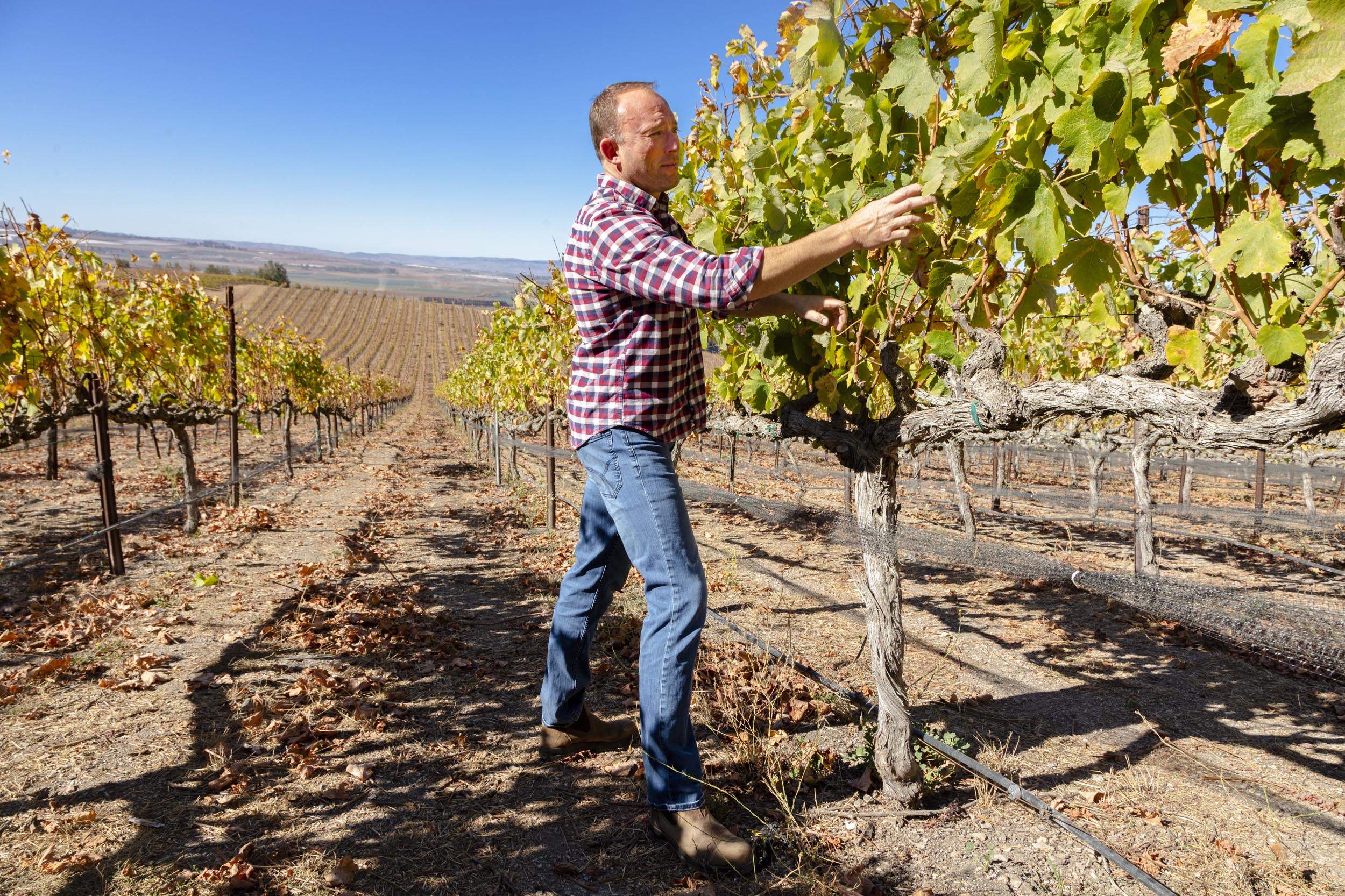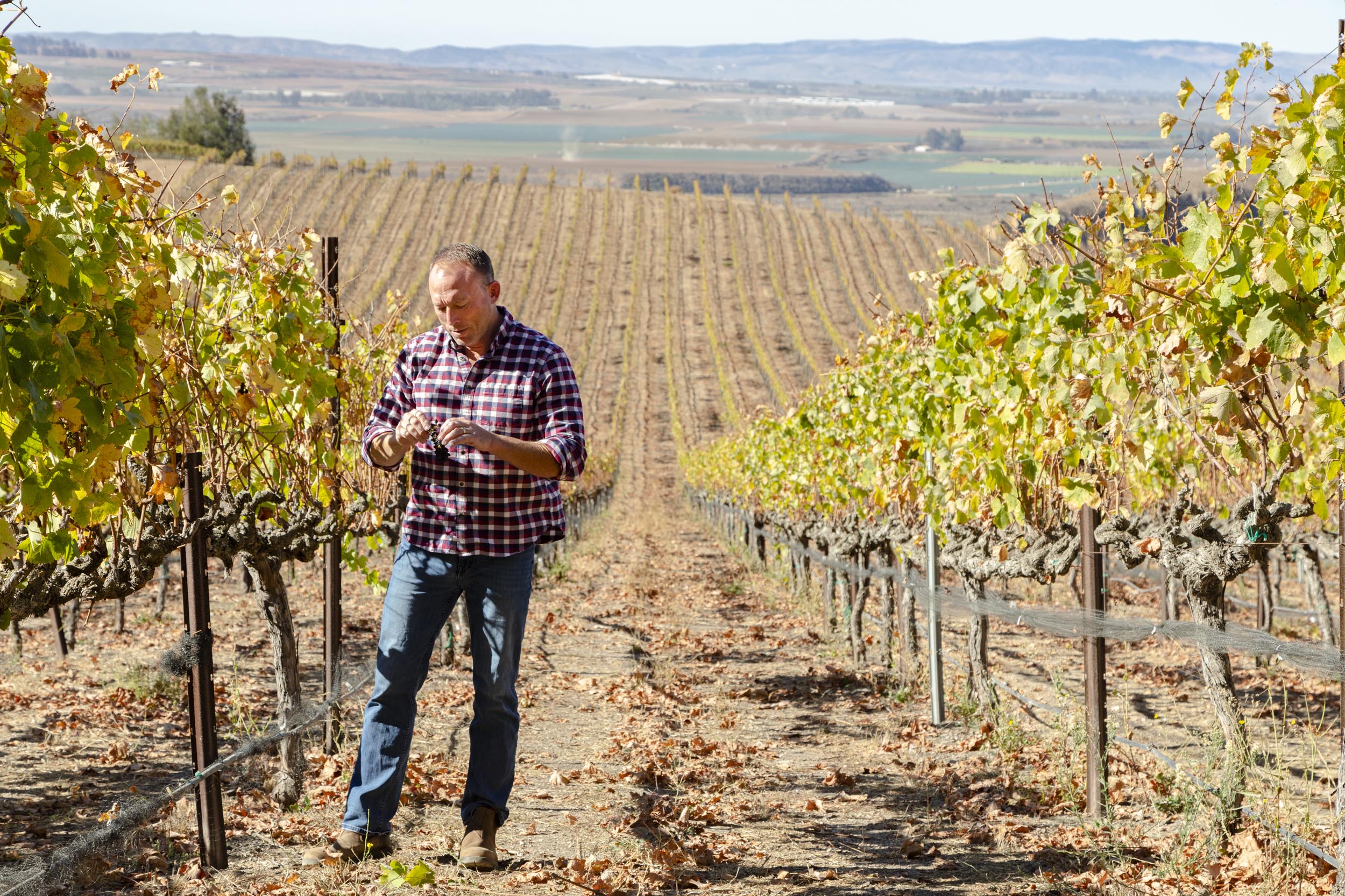Bidding Adieu to
Bien Nacido’s
Vineyard Guru
How Chris Hammell’s Career
Reflects the Past and Future of
Santa Barbara County Wine
By Matt Kettmann | May 2, 2024

When Chris Hammell started at Bien Nacido Vineyard a quarter-century ago, it was already well-known for growing some of the most compelling pinot noir, chardonnay, and syrah on the Central Coast. But the Santa Maria Valley property, which stretches across the mouth of a prominent canyon from steep hillsides to gentle slopes to alluvial flats, was not yet heralded as “the most vineyard-designated vineyard in the world.”
That distinction — essentially self-proclaimed, but never disputed — means that more winemakers who buy grapes proudly call out “Bien Nacido” on their labels than they do for any other vineyard. Translating such jargon into layman’s terms, the phrase implies that Bien Nacido is one of the most respected places for wine grapes on the planet, and that recognition is a critical reason that Santa Barbara County at large is home to a bustling wine industry at all.
This coming fall, after the last grapes of the 2024 vintage have been picked, Hammell will be leaving his role as Bien Nacido’s ranch manager to embark on his next, as-yet-known adventure. It marks the end of a particularly propitious era in Santa Barbara wine, bridging the pre-Sideways days to the global renown of today, when even celebrated wineries from Champagne and Burgundy are investing in land here.
“Especially after I got with winemakers like Manfred Krankl and Bill Wathen and Adam Tolmach and Jim Clendenen and Bob Lindquist, I got jazzed up about what it would be like to grow grapes at a high level,” said the ever-humble Hammell, giving equal credit to the Miller family, who owns Bien Nacido, and former colleagues like James Ontiveros and Michael Brughelli, who sold the grapes he grew. “We got to do something a little bit extraordinary, and we kinda hit some highs, and we got good recognition for it. It was just fun to be a part of that. I’m glad they let me put some of my mind to it. I was just part of a big thing that we happened to ride.”
The Miller family — who own Bien Nacido as well as the nearby Solomon Hills Vineyard and French Camp in Paso Robles — will be sad to see Hammell leave. The news is especially emotional since Hammell has lived on the property since he was hired in November 2000 with his wife, Dayna, who runs the estate’s hospitality program, and their four kids.
“Under his guidance, the vineyard and the wineries we were working with expanded greatly over the last couple decades to the point that it’s being considered one of the greatest vineyards in the world,” said second-generation vintner Nicholas Miller. “That’s a pretty unique thing for a vineyard to transcend regionality.”
“His generational impact on Bien Nacido is pretty profound,” said Marshall Miller, Nicholas’s brother and the family’s COO. “What makes Chris really special is his ability to work with a broad diversity of winemakers stylistically in an appropriate way to command their respect and their deference. Chris has been able to work with people to achieve their vision in winemaking, but in a way, they are prepared to trust and rely on him.”
It was their dad, Stephen Miller, who with his late brother Bob Miller hired Hammell and, in 2011, built a comfortable home on site for the family. “He’s been a wonderful, wonderful representative of the company,” said the elder Miller, noting that Hammell is special in multiple ways, from his world championship jiu-jitsu practice to his guitar playing in the Tepusquet Tornadoes. They’re looking for a replacement now, but Miller readily admitted, “It won’t be anyone who can create a rock band in his garage the way Chris has.”
Hammell’s amicable departure, in the works although mostly secret for more than a year, couldn’t come at a more pivotal time, both for the Miller family and the California wine industry at large.
The industry is facing unprecedented challenges. Vine disease is on the rise, climate craziness is affecting year-round weather, and prices are skyrocketing for everything from glass to labor. Then there’s more competition from other alcohol and cannabis products than ever, and emerging generations of consumers just aren’t drinking as much of anything. Since farming decisions today will affect options decades into the future, vineyard owners are walking a tightrope between supply and demand like they haven’t had to do in a generation.
The Millers are on that exact tightrope. After entering the wine business in the early 1970s as solely grape growers, the Millers shifted their business model over the past 15 years into producing wine, from small-batch, high-touch estate projects to broad-market, nationally distributed brands.
Last year, they closed their Central Coast Wine Services facility in Santa Maria, the breeding ground for dozens and dozens of iconic Santa Barbara wine brands. After attempting to make that the home base for their own larger wine production plans, they grew frustrated with the County of Santa Barbara’s strict regulatory environment and are now selling the massive complex outside of the wine industry. They’ll base their winemaking operations elsewhere.
Though they will continue selling grapes into the future, they’re in the midst of massive replanting projects at Bien Nacido — now down to about 350 acres of vine from the 900-acre peak — and across the Santa Maria Valley at Solomon Hills, where the 100 acres have been scaled down to a mere dozen. Recent drives by Solomon Hills, which sits on Highway 101, recalled a sort of grapevine apocalypse, with piles of ripped plants surrounded by naked, scraped earth.
“In 10 years, farming on the Central Coast is going to look a lot different than it does today,” said Marshall Miller, who believes there will be much more mechanized farming. There will also be increased attention on eliminating grape disease like leaf roll, which is what forced them to rip out so many Bien Nacido vines. “We may be the first to do this at our size, but we do not believe that we are the last,” he said. “This is a cresting wave that is coming, so we are prepared to take dramatic action.”
The Millers will continue some of their artisanal, hand-farming practices, but not all of their grape customers will be able to keep up with the increased prices required to make those practices pencil out. “There are programs that can hit that bottle price-wise, and there are ones that can’t,” said Miller. “Where we are headed is a narrower set of customers.”
Whereas Hammell was integral to the growth and popularity of Bien Nacido, the future strategy will be more about technology and tightening. “It will be a new version of Bien Nacido,” said Hammell, who believes the Millers will continue to lead the industry on many fronts. “There’s still a lot of room for our industry to grow in how we farm and a lot more progress that we can make on the labor front.”
It’s not the typical wine country love story, but Chris and Dayna Hammell both went to Arroyo Grande High and Cal Poly. They married in 1996, the same year Chris took his first vineyard job at Cambria. When he went north to work at David Bruce Winery in the Santa Cruz Mountains, Dayna stayed at his parents’ house with their first two kids.
“We reunited as a family at Bien Nacido,” she said of Chris being hired there in 2000. “We were thrilled.”
In addition to working for the Millers — Dayna started helping with preparing food and organizing hospitality for wine writers, winemakers, holiday parties, and the like in 2004 — the Hammells became deeply invested in the Santa Maria Valley. All four kids attended the tiny Blochman School, where Chris coached basketball and Dayna was PTA president.

“It was very special to have been able to raise all four kids in the same place without moving around,” said Dayna, whose youngest graduates from high school this summer. “Twenty-four fast years, right? It seems like yesterday, honestly. It’s crazy to think that we’re at this point, but the timing is right for our family.”
Of all his triumphs, Chris is quite proud of his own small, head-trained vineyard that he planted on Bien Nacido to build his own wine brand called True Believer, which became a cult hit for lovers of powerful grenache and syrah. Yet even after recently sharing many vintages of those wines over a roast pork lunch made by Dayna at the Hammells’ Bien Nacido home, where winemakers and their kids filtered in and out, Chris wasn’t sentimental about his departure.
“I don’t want to get all nostalgic. I just put it in a corner of my mind and don’t deal with it. I don’t know if that’s good. I do that with dead people too,” said Hammell, always sporting a wry smile. “It ran its course and it’s done and I may not do something as good again, or maybe I will. But I’ll never have this experience of meeting with so many winemakers all at once. It was great. I’ll miss the ground.”
The Millers are now actively looking for a new ranch manager, albeit somewhat wistfully. “I think there’s a cognizance that there are other things he wants to accomplish in life, and I respect that,” said Marshall Miller. “I’m sad that he’s come to that conclusion, but I deeply respect why he has.”




























You must be logged in to post a comment.